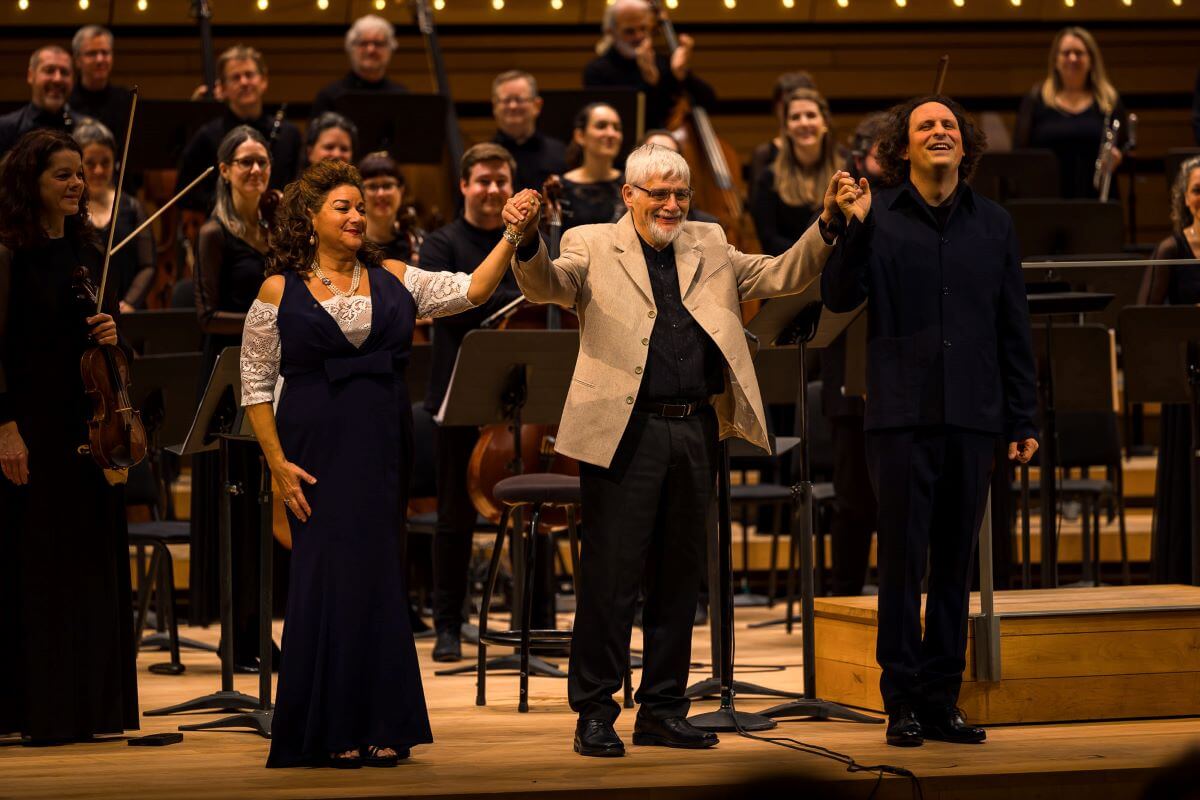
Not all prizes devoted to music composition yield prizeworthy results. Happily, one of three scores performed at the Azrieli Music Prizes gala Thursday night at the Maison symphonique handily won the all-important I Want To Hear It Again award while another took Big Hit With The Audience honours.
Two of the prizes were for new commissions heard in their premieres. One was for an existing work on a Jewish theme: Out of the depths have I cried unto Thee, O Lord, a 2008 set of psalms for soprano and orchestra by Aharon Harlap, a Winnipeg-born Israeli. It is fair to say that its North American premiere was overdue. Here was lyricism of a Mahlerian stamp that never seemed derivative married to a sure sense of the joys and sorrows inherent in the texts. Orchestration was lucid and colourful; the use of horns in Psalm 121 sagely exploited the power of this instrument to sound ancient and modern at once.
Our soloist was none other than Sharon Azrieli, progenitor of the prizes and a member of the board of the Azrieli Foundation. Lately the Montreal soprano has tried out the popular songbook, but music like this, both operatic and cantorial, is suited to her sound and style. The impression was of complete sincerity. I am guessing that the Hebrew was spot-on.
This 25-minute song cycle followed another, Shahin-nameh, by Iman Habibi, a Torontonian born in Tehran, who is the winner of the Azrieli Commission for Jewish Music. Starting with a full-orchestra sforzando that I would class (from a relatively close seat) as dangerously loud, the piece toggled between roughhouse percussion and cinematic strings, occasionally developing something like a syncopated pop beat.
The text was said to be derived from 14th-century Judeo-Persian poetry. The vocalist (and, briefly, setar soloist) was Toronto-based Sepideh Raissadat. Heavy amplification had the unhappy effect of redoubling what struck these Western ears as an unsophisticated tone and manner. It should be said that Raissadat has recordings and television appearances to her credit.
There was another commission prize, for Canadian music, won by Birds Calling…from the Canada in You, a 25-minute miscellany of imitation birdcalls and other sonic odds and ends by Vancouver-based Rita Ueda. Winds were stationed in the balconies and choir loft; two players of Asian folk instruments slowly walked down the aisles. Hundreds of species of birds were promised, all in the interest of representing the Canadian soundscape and the diverse population of the country. The “O Canada” call of the White-throated Sparrow was prominent, though rather inauthentically rendered on the suona, a Chinese trumpet-shaped instrument.
There were many other modernist moments, including the old orchestra-tuning-up gambit. We were warned of a gunshot, which materialized predictably (and cynically) at the very end of a peaceable coda. Is this how we celebrate the Canadian environment?
The gala crowd, confined to the parterre, thought well enough of the strategy to give the piece a rousing ovation, although some of the praise was surely for the hard-working Orchestre Métropolitain, a reliable advocate of all this unfamiliar music. Credit is also owing the French conductor Alexandre Bloch, who always got to the heart of the matter while dealing with considerable technical challenges (and, in the case of the Ueda piece, histrionic duties that turned him into something of a vaudevillian).
The concert was broadcast live on Medici TV. Sharon Azrieli announced that the 2024 edition of the biennial gala would include a new commission prize for international music.
Inscrivez-vous à notre infolettre! La musique classique et l’opéra en 5 minutes, chaque jour ICI
- SCRUTINY | Azrieli gala a popular success - 22 octobre 2022
- COMMENTARY | Why Playing Political Hot Potato With Artists Is A Terrible Idea - 23 mars 2022
- REVIEW |Tenor Spyres flies high at Lanaudière despite the downpour - 14 juillet 2019



